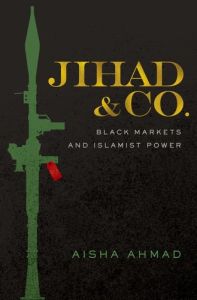Join getAbstract to access the summary!

Join getAbstract to access the summary!
Aisha Ahmad
Jihad & Co.
Black Markets and Islamist Power
Oxford UP, 2017
What's inside?
Islamist proto-states proliferate amid civil wars by cutting the security costs of doing business.
Recommendation
Aisha Ahmad, assistant professor of political science at the University of Toronto, says policymakers should be aware of the business community’s power to influence political outcomes and battlefield results – in other words, they should follow the money. She provides a rich, instructive history of Islamist jihad business activity during the Afghan and Somalian civil wars. She says these conflicts led businessmen to grow beards, wear traditional Muslim clothing and support Islamic charities to project an identity that cut across factions and reached more customers. Some Islamist groups established order by drawing support from opposing factions – even during civil wars – and lowering the cost of doing business.
Summary
About the Author
Aisha Ahmad, an assistant professor of political science at the University of Toronto, is a senior researcher at the Munk School of Global Affairs.
















Comment on this summary